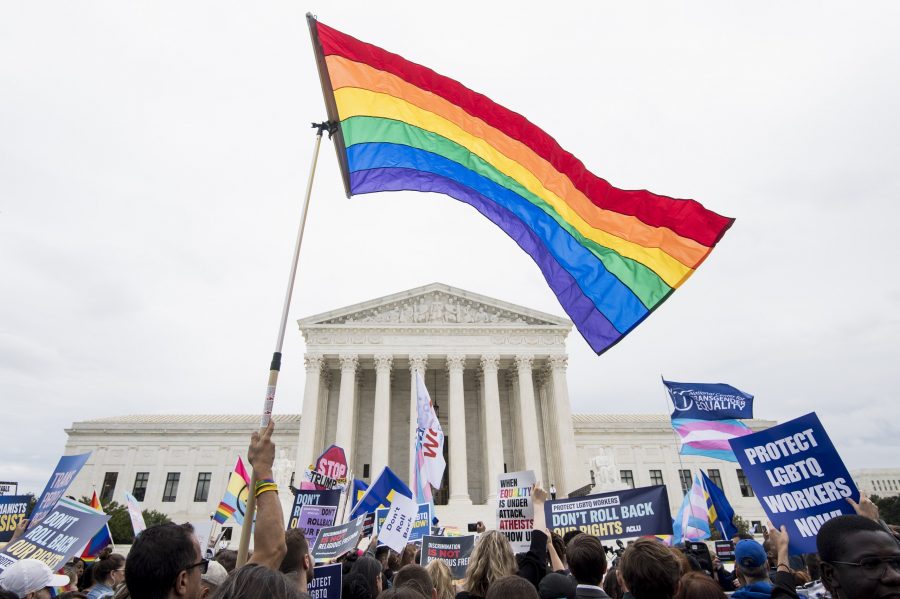The Double-Edged Sword: An Examination of Religious Freedom
October 22, 2019
Since the early years of this nation’s history, religious freedom has been constitutionally protected by the First Amendment. For two decades following its ratification, this protection existed peacefully and without contention – until a landmark Supreme Court case rocked the nation. Bowers v. Hardwick was the first time in American history that the Supreme Court debated the legality of homosexuality. Ultimately, the court ruled against the gay defendant, largely on the basis of religion.
This case marked the beginning of a new, ongoing era in American civil rights, characterized by the question: When does religious freedom cross the boundary into discrimination? The regrettable truth is that if we examine recent events, it becomes abundantly clear that religious freedom, a protection that undoubtedly offers immense good to the country, has also been increasingly manipulated and corrupted to justify egregious discrimination against the LGBTQ+ community.
A prime illustration of this point can be found in Catholic schools. In recent years, these institutions have become the subject of fierce debate due to their unabashed discrimination against members of the LGBTQ+ community. For instance, according to NBC News, a woman named Lynn Starkey, who has worked at a Catholic high school in Indianapolis for the past 40 years, was fired from her job after the school discovered that she was married to a woman. Starkey is suing the school and the archdiocese, who, coincidentally, is already under fire in a similar suit. Beyond the issue of discriminating against LGBTQ+ employees, Catholic schools across the nation are also facing lawsuits over denying admission to children of same-sex parents and placing blanket bans on transgender and homosexual expression.
By and large, most Americans are against LGBTQ+ discrimination. In fact, “majorities in every state across the country favor nondiscrimination protections for LGBT people” (PRRI). As a result, you might naturally expect that court decisions and legislation would reflect the will of the majority – yet, somehow, the facts do not line up this way. As we near the end of 2019, the supposed “land of the free” still has a grand total of zero federal protections against discrimination on the basis of sexual orientation or gender identity.
However, this atrocious disparity between American ideology and reality could be on the verge of changing. According to the New York Times, three ongoing Supreme Court cases are debating whether Title VII of the Civil Rights Act, which prohibits discrimination on the basis of race, color, religion, national origin, or sex, extends to the LGBTQ+ community. Currently, job discrimination against homosexual and transgender workers is legal at a federal level. However, “if the court decides that the law, Title VII of the Civil Rights Act, applies to many millions of lesbian, gay, bisexual and transgender employees across the nation, they would gain basic protections that other groups have long taken for granted.”
Unfortunately, although some justices, like Justice Elena Kagan, are leaning towards a vote in favor of the plaintiffs, there are still quite a few who are concerned about the implications such a ruling would have on the religious freedom of employers. Justice John Roberts Jr., for instance, has expressed concern that, “a ruling in favor of the plaintiffs would not adequately protect employers with religious objections to same-sex relationships and transgender status” (New York Times). Here, once again, we see the pervasive and recurring perversion of religious freedom to justify discrimination. After all, this is far from the first time a federal power has considered extending protections to homosexual and transgender citizens. In 1994, Congress attempted to pass the Employment Nondiscrimination Act. Moreover, they recently considered the Equality Act, a much broader legislation which would not offer exemptions or concessions to religious employers (National Review). Although neither of these acts were passed, they sowed the seeds of change in the nation, making the outcome of these three federal cases unequivocally critical. The Supreme Court’s ruling could mark a turning point in American civil rights – for better or worse.
The United States prides itself on the ideal of freedom. Our pledge of allegiance promises “liberty and justice for all,” and our national anthem has dubbed us “the land of the free and the home of the brave.” But we must understand that liberties are not mutually exclusive. Religious freedom can and should coexist with equal rights for the LGBTQ+ community. If we deny liberty to millions of American citizens, it is more than a contradiction of our core principles. It is a sign that equality only applies when convenient and that freedom takes the path of least resistance. To draw from the eternal words of George Orwell, it sends the message that all citizens are equal… but some are more equal than others.




